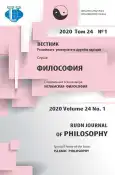Rorty’s socio-ethnocentrism: the problem of its justification
- 作者: Dzhokhadze I.D.1
-
隶属关系:
- RAS Institute of Philosophy
- 期: 卷 24, 编号 1 (2020): ISLAMIC PHILOSOPHY
- 页面: 77-88
- 栏目: SOCIAL PHILOSOPHY
- URL: https://journal-vniispk.ru/2313-2302/article/view/325028
- DOI: https://doi.org/10.22363/2313-2302-2020-24-1-77-88
- ID: 325028
如何引用文章
全文:
详细
‘Solidarity’ is one of the key concepts of the late Richard Rorty’s philosophy. Arguing that justification of knowledge is a matter of its acceptance by the community, Rorty reduces social relations to the discursive (intertextual or dialogical) ones. Thereby he faces a number of theoretical difficulties. Rorty’s willingness to substitute the idea of objectivity for that of solidarity is at odds with his socio-ethnocentrism. Antirepresentationalist attitude is not shared by the overwhelming majority of Rorty’s ‘cultural peers’, not to mention professional philosophers, but he strongly holds to antirepresentationalism, considering it to be sufficiently justified, not caring about what others think and whether such a strategy is politically relevant or desirable from a pragmatic point of view. Consequently, he endorses the picture of warrant as independent of communal opinion. Western (Anglo-Saxon) ethnocentrism, Rorty argues, is of a special kind: it is the ethnocentrism of a “we-community” (“we liberals”) which is dedicated to enlarging itself and creating more and more variegated, inclusive and heterogeneous society. It’s a worldview of a liberal “ironist” and cosmopolitan who is always aware of the contingency of her language and moral self, and who “has radical and continuing doubts about the final vocabulary she currently uses”. But to say, with Rorty, “We are lucky that our ethnocentrism is based on distrust of itself,” amounts to recognize the truth of anti-ethnocentrism. One who believes in cultural and social progress towards “a global, cosmopolitan, democratic, egalitarian, classless, casteless society” is de facto anti-ethnocentrist. Even if he denies it verbally.
作者简介
Igor Dzhokhadze
RAS Institute of Philosophy
编辑信件的主要联系方式.
Email: joe99@mail.ru
PhD in Philosophy, Leading Research Fellow, Head of the Department of Contemporary Western Philosophy. Institute of Philosophy
12/1 Goncharnaya Str., Moscow, Russian Federation, 109240参考
- Rorty R. Sluchajnost', ironiya i solidarnost'. Trans. from English by I Hestanovoj, R Hestanova. Moscow: Russkoe fenomenologicheskoe obshchestvo; 1996. 282 p. (In Russ.)
- James W. Pragmatism: A New Name for Some Old Ways of Thinking. N.Y.: Longman’s, Green & Co, 1907. 309 p.
- Rorty R. Objectivity, Relativism, and Truth. Cambridge: Cambridge University Press, 1991. 226 p.
- Richard Rorty to Anindita Balslev. In: Balslev A.N. Cultural Otherness: Correspondence with R. Rorty. Atlanta: Scholars Press, 1999. P. 89—101.
- Rorty R. Philosophy and the Mirror of Nature. Princeton: Princeton University Press, 1979. 401 p.
- Blackburn S. Truth: A Guide for the Perplexed. L.: Allen Lane, 2005. 238 p.
- Putnam H. Realism with a Human Face. Cambridge: Harvard University Press, 1990. 347 p.
- Williams B. Terrestrial Thoughts, Extraterrestrial Science. London Review of Books. 1991; 13(3): 12—13.
- Putnam H. Words and Life. Cambridge: Harvard University Press, 1995. 531 p.
- Detmer D. Rorty on Objectivity and Truth. In: The Philosophy of Richard Rorty. Ed. by RE Auxier, LE Hahn. Chicago: Open Court, 2010. P. 367—390.
- Rorty R. Reply to Piotr Gutowski. In: Debating the State of Philosophy. Ed. by J. Niznik, J.T. Sanders. Westport: Praeger, 1996. P. 114—115.
- Allen J. Rationality, Relativism, and Rorty. South African Journal of Philosophy. 1992; 11: 52—61.
- Comay R. Interrupting the Conversation: Notes on Rorty. Telos. 1986; 69: 119—130.
- Ramberg B. Strategies for Radical Rorty. In: Meta-Philosophie: Reconstructing Philosophy? Ed. by J. Couture, K. Nielsen. Calgary: University of Calgary Press, 1993. P. 223— 246.
- Rorty R. Philosophy and Social Hope. Harmondsworth: Penguin Books, 1999. 288 p.
- Rorty R. Fighting Terrorism with Democracy. Nation. 2002; 275(13): 11—14.
- Rorty R. Humiliation or Solidarity? The Hope for a Common European Foreign Policy. Dissent. 2003; 50(4): 23—26.
- Rorty R. Achieving Our Country: Leftist Thought in Twentieth-Century America. Cambridge; L.: Harvard University Press, 1998. 159 p.
- Schneewind JB. Rorty on Utopia and Moral Philosophy. In: The Philosophy of Richard Rorty. Ed. by RE Auxier, LE Hahn. Chicago: Open Court, 2010. P. 479—505.
- Bernstein R. The New Constellation: The Ethical-Political Horizons of Modernity/Postmodernity. Cambridge: Polity Press, 1991. 358 p.
- Putnam RA. Rorty’s Vision: Philosophical Courage and Social Hope. In: Putnam H, Putnam RA. Pragmatism as a Way of Life: The Lasting Legacy of William James and John Dewey. Ed. by D Macarthur. Cambridge: Harvard University Press, 2017. P. 87—107.
- Sen A. Identity and Violence: The Illusion of Destiny. N.Y.: W.W. Norton and Company, 2006. 240 p.
- Gerc K. Pol'za raznoobraziya / Per. s angl. V. Ivanova, E. Solov'eva // THESIS. 1993; 1(3): 168—184. (In Russ.)
- Rorti R. Etika bez vseobshchih obyazannostej. Kruglyj stol v Institute filosofii RAN / Trans. from English by E Petrovskoj. In: Filosofskij pragmatizm Richarda Rorti i rossijskij kontekst. Moscow: Tradiciya, 1997. S. 56—110. (In Russ.)
- Rorty R. Dewey, Democracy, and China. Dao: A Journal of Comparative Philosophy. 2003; 3(1): 1—6.
- Rorty R. Philosophy as Poetry. Charlottesville: University of Virginia Press, 2016. 96 p.
- Ryder J. Richard Rorty, Contemporary Philosophy, and the Problem of Ethnocentrism. International Journal of Cultural Research. 2011; 1(2): 118—120.
- Mendus S. “What of Soul Was Left, I Wonder?” The Narrative Self in Political Philosophy. In: Literature and the Political Imagination. Ed. by J. Horton, A.T. Baumeister. L.: Routledge, 1996. P. 53—69.
- Kautz S. Liberalism and Community. Ithaca: Cornell University Press, 1995. 232 p.
- Kallen HM. Culture and Democracy in the United States. N.Y.: Boni and Liveright, 1924. 347 p.
- Rorty R. Response to Jürgen Habermas. In: Rorty and His Critics. Ed. by R. Brandom. Malden: Blackwell, 2000. Р. 56—64.
- Take Care of Freedom and Truth Will Take Care of Itself: Interviews with Richard Rorty. Ed. by E. Mendieta. Stanford: Stanford University Press, 2006. 250 p.
补充文件









